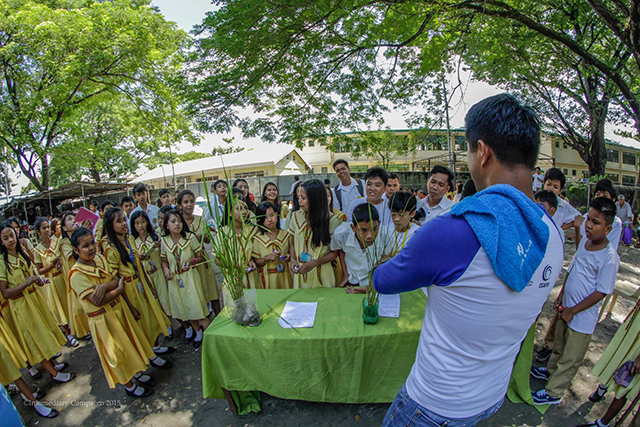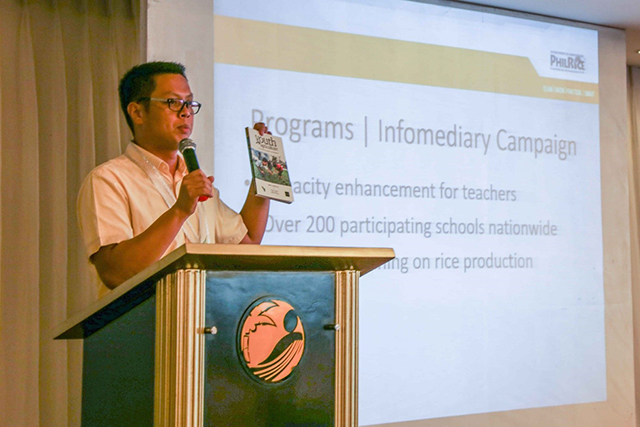 In a sector that rarely gets the spotlight, educators will have to take the center stage all-equipped with pedagogical strategies to lure the youth into agriculture.
In a sector that rarely gets the spotlight, educators will have to take the center stage all-equipped with pedagogical strategies to lure the youth into agriculture.
Now that the K to 12 program is gaining momentum, our teachers who handle agriculture-related subjects may have to level up in nurturing the future workforce that will propel the agriculture sector.
A recent industry summit organized by the Department of Education gathered over 200 school representatives, mostly principals, to share and learn updates and best practices relative to the implementation of the Senior High School (SHS) Program.
In a session representing the Department of Agriculture as a related agency, Jaime A. Manalo IV of the Philippine Rice Research Institute (PhilRice) drew out results from studies on the Infomediary Campaign, PhilRice’s youth engagement initiative in agriculture.
The campaign uses the school as the nucleus of agricultural extension. Students serve as “infomediaries” who facilitate access to information on cost-reducing and yield-enhancing technologies on rice. Other than reading materials, they also access information through the Pinoy Rice Knowledge Bank, an online portal on rice, and the PhilRice Text Center, an SMS-based consultation services for farmers.
Increasing enrollment
Agriculture remains as one of the less ‘cool and sexy’ career path as evidenced by low enrollment figures. One can easily argue that it is not a lucrative profession with a typical perception that you’ll end up being ‘just’ a farmer when you take this path. Manalo, project leader of the Infomedairy Campaign, recommended the following strategies to address this mindset issue.
- Know the young people more
A 2013 study of Manalo and Elske van de Fliert found out some reasons behind rural Filipino youth’s outmigration from agricultural communities. These include the attachment of poverty to agriculture, parental influence, and the youth’s disinterest in farm chores.
“Agriculture has an emotional, not just academic, dimension,” Manalo furthered.
He added that aside from the hard core technical lessons, SHS teachers should also highlight the importance of agriculture in our society.
- Promote agri as a viable and versatile career option
Agriculture is not just about tilling the soil. One does not even have to be an agriculturist to contribute to this industry. Agriculture also needs entrepreneurs, economists, sociologist, and agricultural journalists, among others.
If educators are able to promote agriculture as a viable and versatile career option, they may do well in encouraging high school students to take agriculture and related sciences as their course in college.
Manalo and his team have documented significant increase in agri-related tracks of those who participated in the Infomediary Campaign that now operates in over 200 secondary schools.
“For instance in Maguling National High School in Sarangani, there were only 37 students interested in agriculture courses before we launched the campaign. After the key campaign activities, that number increased to 108,” Manalo cited.
- Engage the parents
Engaging the students’ parents is also another way to influence the youth in pursuing a career in agriculture. TeknoKliniks, one activity of the Infomediary, gather the parents to discuss and ask questions on rice production technologies.
“The parents should know what’s going on in the schools. We feel that we need to engage them so they, too, will know how they can benefit from this undertaking,” said Manalo.
He added that the parents should know that there is money in agriculture. Agripreneurship (doing business from agriculture) is something that should be inculcated in their minds.
Operating for almost four years now, the Infomediary Campaign has launched this year a book on Youth & Agriculture that documents how-tos and strategies in engaging young people in agriculture. Some of its best-fit practices are listed below.
- Schedule practical activities to early morning or late afternoon
For practical activities on agriculture subjects, it is recommended to have it early morning or late afternoon.
“Primarily, this is to avoid the scorching heat of the sun. In the afternoon, students don’t mind getting dirty as they will just head home afterwards,” Manalo explained.
- Integrate edutainment in teaching
Edutainment methods are also preferred by the students. This includes field tours or exposure trips, agri-games, and training on the basics of farming.
Experiential learning can also be facilitated by establishing a rice garden that can give students hands-on experience in farming at the vicinity of their schools. Supervised by their teachers, students are able to improve their confidence to serve as infomediaries who can share their learnings to their parents and other farmers in their communities.
- Relate agri to the community
Manalo also recommended to relate agriculture to the wider applications in the community.
“In our sites in Davao Oriental and Occidental Mindoro, the students enjoyed farm chores as they saw how these relate to their community. The students later on ended up doing an outreach activity to promote cost-reducing and yield-enhancing technologies on rice,” he stated.
- Use effective learning tools and strategies
A recent study of the Infomediary team also revealed that learning tools and strategies matter in effectively teaching climate smart agriculture. Fieldworks and the use of videos, pictures, internet, flipcharts, and PowerPoint presentations are favored by the students.
“There are really no silver bullets, no easy answers on how to lure young people to take agriculture-related courses. The thing is we can and should always try,” Manalo concluded.
Visit www.infomediary4d.com for more details and download teaching materials for free.





